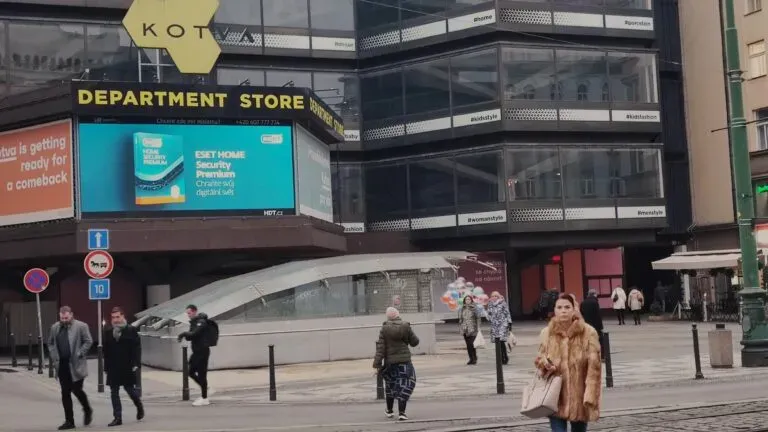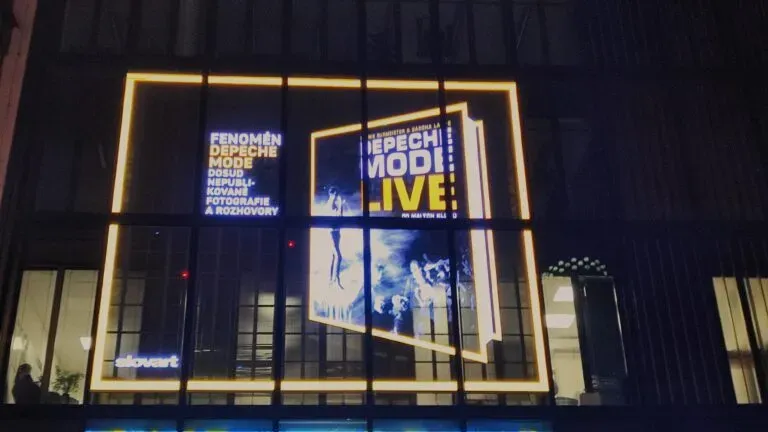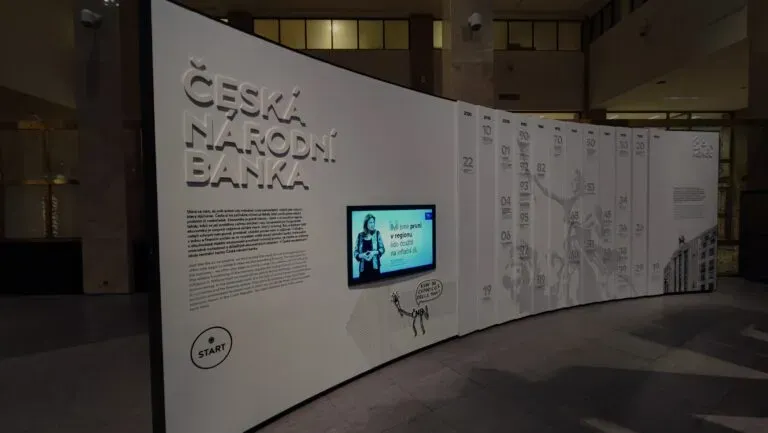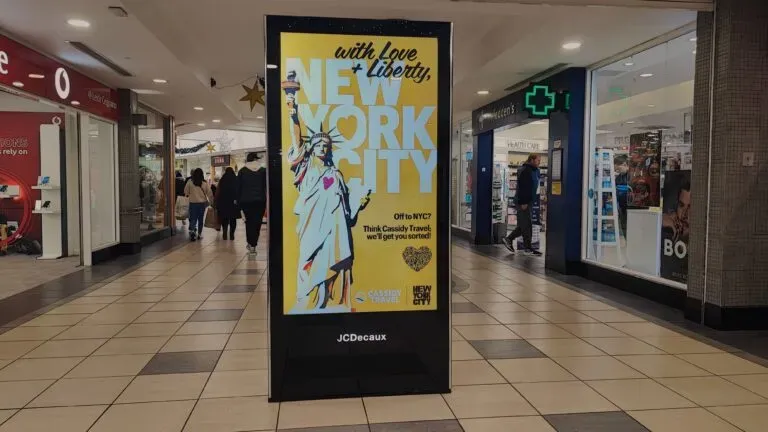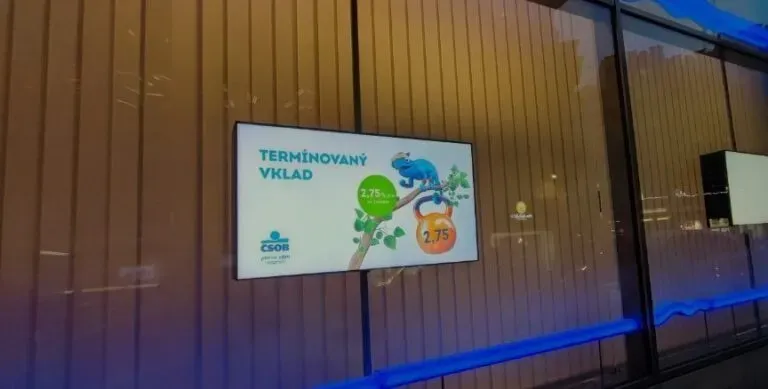Media facades and 3D DOOH advertising for effective promotion
Do you want your brand to be at the center of attention for a wide audience?
For this, there is digital outdoor advertising, or DOOH (Digital Out-of-Home—digital signage for outdoor environments). Advertising media related to outdoor advertising are divided into different formats. Let’s explore this variety and understand what advantages they offer to advertisers.
Thanks to dynamic 3D effects, interactivity, and massive reach, DOOH helps brands become recognizable, gain trust, and increase sales. Large screens with bright images evoke emotions in the audience and encourage spontaneous actions. Modern software for video walls and other types of screens is a key component that allows easy content management, while a digital signage player ensures uninterrupted broadcasting of advertising materials. Any screen turns into a pile of metal without modern CMS.
What are media facades?
Modern cities are unimaginable without bright lights and dynamic screens that attract the attention of passersby. It is media facades and DOOH technologies that make the urban environment more vibrant and create that very atmosphere of a metropolis.
A media facade is a building facade equipped with LED screens or panels that can display dynamic content: advertisements, informational messages, and video clips. Thanks to integration with pDOOH (programmatic DOOH), content can change in real time depending on weather conditions, time of day, or audience characteristics.
Types of media facades
Several types of media facades are used in Ukraine, differing in construction type, technology, and installation method. Here are the main ones:
1. Classic LED media facades
This is the most common type. They consist of LED panels that provide bright and clear images. Features:
– High brightness, allowing content to remain visible even in bright sunlight.
– Weather resistance, making them reliable for long-term use.
– Wide viewing angle, ensuring that ads are well seen from different parts of the city.
– The ability to remotely manage content using video wall software.
2. Transparent media facades
These are screens that look like a mesh or glass, allowing light to pass into the building. Features:
– Such media facades let people see what is happening outside without obstructing the view from inside.
– Minimal impact on the architectural style of the building, making them ideal for historical or modern structures.
– Using them in combination with a digital signage player enables easy content updates without physical intervention.
3. Flexible LED screens
These are screens that can be adapted to non-standard building shapes. Features:
– The ability to wrap screens around corners, columns, and other complex architectural elements.
– Easy integration with pDOOH for dynamic content updates.
– Increased flexibility in creating unique advertising campaigns, enhancing communication effectiveness with the audience.
Using modern digital signage combined with video wall software allows businesses not only to effectively engage with customers but also to quickly adapt to changes in advertising campaigns. Media facades open new opportunities for marketing, transforming the city into a vast interactive space.
4. Media facades with 3D effect
This type of media facade uses optical illusions to create a depth effect, making the image more realistic and attractive to viewers. These screens enable brands to create memorable advertising campaigns. Features:
– Require meticulous design and precise pixel placement.
– Ensure maximum audience engagement through an immersive effect.
– Support dynamic content that can change in real time via DOOH software.
– Used in combination with a digital signage player, ensuring uninterrupted ad broadcasting and high-quality display.
Benefits of media facade advertising for business
Media facades and Digital Out Of Home (DOOH) offer vast opportunities for effective audience interaction. Thanks to advanced technologies, video advertising on such screens becomes bright, dynamic, and impactful.
1. Wide reach and active engagement
Placement in crowded locations such as shopping centers, transport hubs, and business districts ensures that the advertisement attracts the attention of a large number of people.
Business benefits: One large screen can replace dozens of traditional advertising media, increasing audience contact frequency.
2. High brand recognition
Dynamic content created using DOOH software makes advertising more attractive and memorable.
Example: Interactive video ads that change depending on the time of day or weather conditions attract more attention than static banners.
Result: Increased brand recognition and higher consumer trust.
3. Flexibility and creative opportunities
DOOH advertising enables unique creative campaigns with real-time content updates.
Example: Advertisements with interactive elements that respond to movement or external factors make audience communication more effective.
Result: Unconventional advertising solutions capture more attention, boosting marketing strategy efficiency.
In today’s competitive environment, using video advertising and digital signage players in combination with DOOH software has become a crucial element of successful business strategies.
Myths about media facades and Digital billboards
Media facades and DOOH networks are powerful tools for attracting customers, but businesses often have concerns about using them. Let’s examine the most common fears and explain why they are unfounded.
1. It’s expensive and unaffordable for small businesses
At first glance, media facades and LED billboards may seem too costly. However, technology is evolving, and now it’s possible to run ads not for the entire day but only during specific hours.
Fact: The flexibility of DOOH advertising allows businesses to work with different budgets. You can choose time slots, set targeting for specific areas or audiences, and optimize costs.
Tip: Start with a small pilot project. For example, test the effectiveness of a single screen in a high-traffic area.
2. Launching an Ad Is complicated
Does it seem like setting up a media facade requires technical knowledge? That’s a myth.
Modern software for LED screens simplifies ad management. DOOH operators provide user-friendly platforms for uploading content, scheduling broadcasts, and monitoring campaigns.
Fact: You can launch an ad at the right moment, for example, when you need to sell off remaining stock.
Tip: Consult specialists who can help set up your first campaign. This will save time and show how simple the process is.
3. People don’t pay attention to this advertising
If you think people don’t notice ads on media facades and LED billboards, that’s not true.
Fact: Research shows that dynamic content attracts 60% more attention than static banners. Creative solutions such as 3D effects or integration with real-world events turn media facades into audience magnets.
Tip: Invest in high-quality content. A concise and vibrant message with a clear call to action works much better than a long list of product benefits.
4. Advertising might not work
Every advertising campaign carries some risks, but advertising screens offer more opportunities for testing and adjustment.
Fact: DOOH advertising allows multiple ad versions to run simultaneously and tracks their effectiveness. This helps identify the best-performing option.
Tip: Define your campaign goals in advance—whether it’s reach, engagement, or sales. This will help tailor the ad to achieve the desired outcome.
Why is it worth it?
Media facades are not just about “cutting-edge technology” or “high costs.” They offer the opportunity to showcase your business in a dynamic, captivating, and memorable way. Thanks to modern DOOH Display Solutions, even small businesses can use this format to stand out from the competition.
Don’t be afraid to try! DOOH advertising has long been an accessible tool that works for you 24/7. All you need is the courage to take the first step. Order billboard and media facade placements across Ukraine—submit your request on our website.
Technological advantages of media facades and DOOH
Media facades and DOOH (Digital Out-of-Home) not only impress with their visual impact but also unlock unique technological possibilities for businesses. They enable the creation of memorable and highly engaging advertising.
1. Flexible settings
Modern media facades and centralized video management systems (DSP platforms) allow for precise configuration of ad banner broadcasts.
How it works: Advertisers can launch campaigns in real time, adjust display schedules, or update creatives remotely via cloud platforms.
Example: A screen can change content based on the time of day, weather, or audience demographics. In the morning—coffee ads, in the evening—restaurant invitations.
Benefit: Flexible management lets businesses adapt advertising to any event, from holidays to spontaneous promotions.
2. Integration with other channels
Media facades are becoming part of omnichannel advertising campaigns, interacting with mobile apps, social media, and chatbots.
Example: A QR code on the screen directs viewers to a website or app, where they can instantly take advantage of the offer.
Result: Media facade advertising enhances the impact of other channels, integrating them into a unified customer interaction system.
Why is this cool?
Technological advantages transform media facades from simple ad screens into a comprehensive tool for creating personalized, creative, and unforgettable campaigns. In today’s world, success belongs to those who know how to capture and hold attention.
We hope this article has reassured you that media facades and DOOH advertising are already a reality. They attract attention, create a wow effect, and help businesses stand out from the competition.
Modern technology makes DOOH accessible to businesses of all sizes. Flexible settings, real-time management, and diverse formats provide vast promotional opportunities.
Interactivity and creativity boost audience engagement. Stunning 3D videos, personalization, and integration with other channels make media facades a powerful customer engagement tool.
The myths about complexity and high costs are outdated. A simple interface, affordable platforms, and the ability to start with a minimal budget make DOOH advertising accessible to everyone.
Advision — Content Management System for remote management and media planning of video and audio content broadcast. We help offline businesses and advertising companies automate workflows and implement reliable Digital Signage infrastructure using our own software and hardware solutions.
Contact us and we will help you implement the most modern technologies to solve your problems!
Share the news





